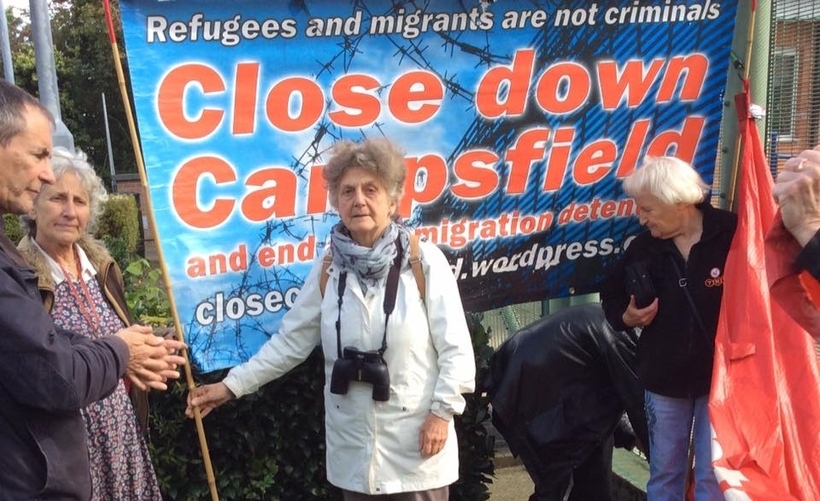Keeping immigration detention centres closed
Bridget Walker highlights the need to keep immigration detention centres closed and shares what Friends can do to help.

For nearly twenty years I was an active member of the Campaign to Close Campsfield House Immigration Removal Centre, a detention facility near Oxford. In 2018 the Home Office shut the centre as part of a policy to reduce the numbers of men and women held in immigration detention. The closure was a moment of rejoicing, particularly for those who had experienced detention or who had feared to be picked up and detained as they went about their daily lives.
Then policy changed again and, to our dismay, the last government proposed to re-open Campsfield House. I joined the new Coalition to Keep Campsfield Closed. Members of the coalition demonstrated peacefully, asked questions at election hustings, circulated leaflets and held street stalls to explain why Campsfield House should not be re-opened. We were shocked to learn that the new government plans to continue with the redevelopment, expansion and reopening of the centre. A protest organised by Oxford students received wide media coverage. The coalition meets monthly to share information and agree actions.
Indefinite detention and accountability
The decision to detain is an administrative one and there is no end date. Men and women can be held indefinitely in prison-like conditions. I have heard people describe the experience as another form of torture.
A team of independent inspectors visit immigration detention centres, produce reports, and make recommendations for improvement. This sounds like a process of accountability. My experience on a stakeholder committee suggested that recommendations were often not followed up and little seemed to change.
Recent inspection reports record serious failings in all eight main detention centres. Buildings are in disrepair, healthcare is limited and residents may experience bullying and racism. The chief inspector of prisons warned that the safety of immigration removal centres across the country is deteriorating and that the government's use of them is potentially traumatising vulnerable migrants.
This makes it all the more urgent to try and prevent the reopening of another centre.
Opposing the plans
We have been here before. There were plans for the expansion of Campsfield House in 2016. These plans were dropped after widespread opposition. The MP for the constituency in which the centre was located, Nicola (now Baroness) Blackwood wrote an extensive letter to the district planning council and met the then PM Theresa May, who dropped the plans.
What has changed? The previous government claimed more detention places were needed to support their Rwanda flights plan. The new government has rightly jettisoned that plan and this is to be welcomed. Why then continue with the project to create more detention places?
The economic argument against detention looks at the financial cost. Detention centres are expensive. Government spent more than half a billion pounds on immigration detention in the four years to 2018, on contracts awarded to private companies. It's big business.
The moral argument looks at the human cost and the harm that detention causes. Numerous reports over the years have demonstrated the damage done to the mental and physical health of all those held in immigration detention. In a statement produced in 2012, and adopted by Britain Yearly Meeting, the Quaker Asylum and Refugee Network (QARN) said "that which is morally wrong cannot be politically right. We urgently call for the ending of indefinite detention, which is fundamentally unjust and causes much suffering to its victims." The leaflet was updated in 2023 and offers suggestions for action.
What can Friends do?
One of the founding aims of the Quaker Asylum and Refugee Network (QARN) is to help Friends "work effectively to promote justice and compassion in the asylum and migration system". Friends who are visitors to detention centres (like the late Crystal Dickinson) bring compassion. Friends qualified to give immigration advice are part of the struggle for justice. This is a dark corner of a broken system. Here are some resources which may shed more light:
- Inform ourselves: detentionforum.org.uk is a good place to start.
- Visit Quaker Asylum and Refugee Network (QARN) website: qarn.org.uk. The website can signpost you to many organisations and reports. Our mailing list sends out regular updates. We hold meetings, organise conferences and support one another in our work. Sign up to join our email group by contacting info@qarn.org.uk.
- Share accurate information: Write to your papers. Use the QARN leaflets outlining what we would like to see after the election.


